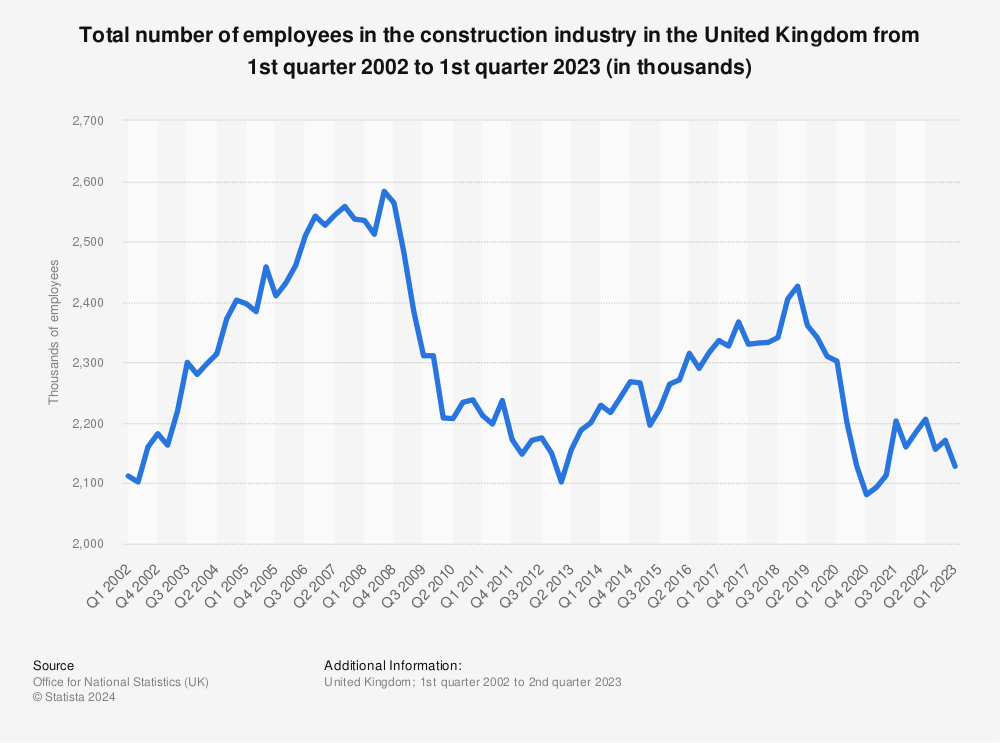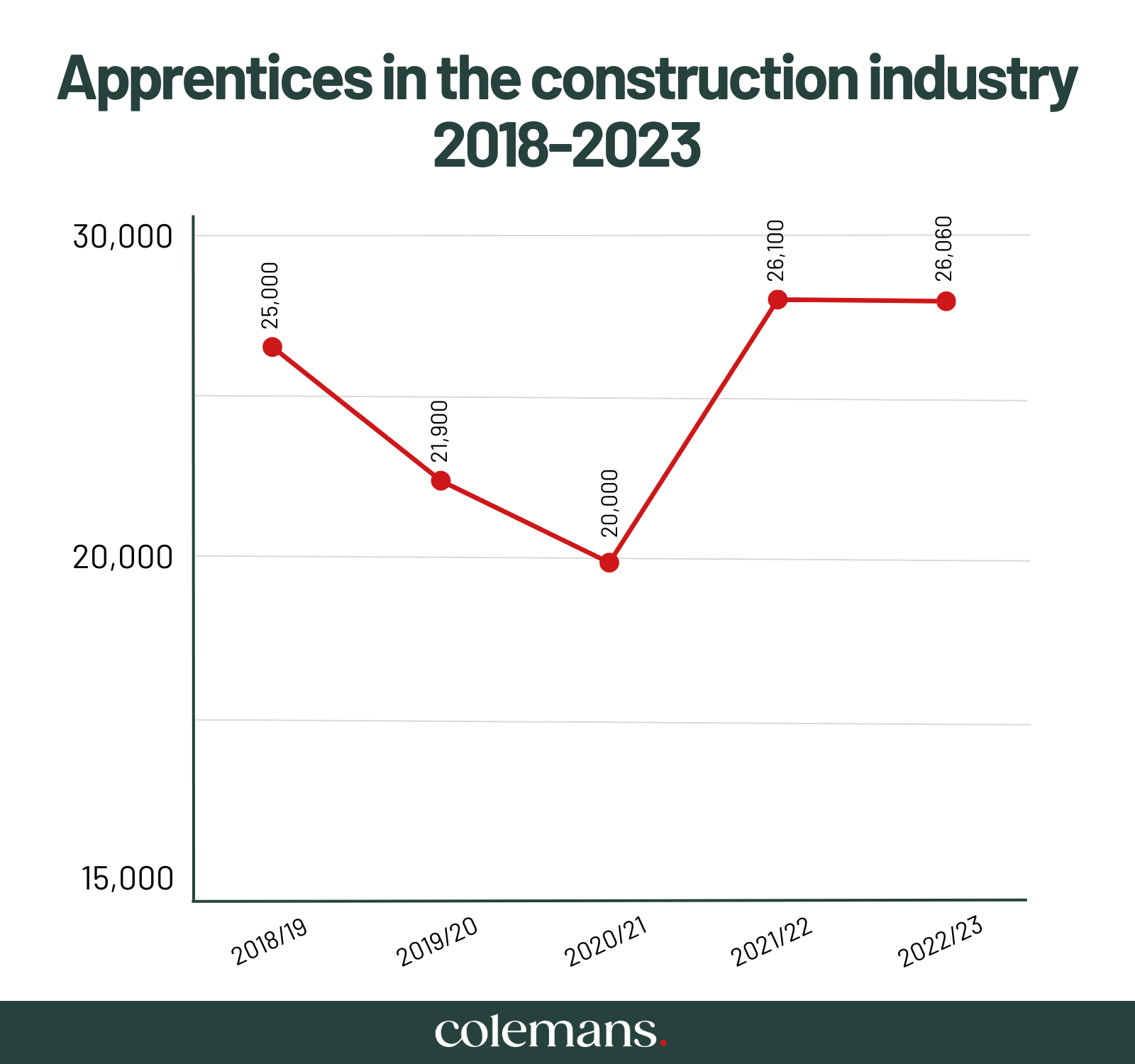Despite the construction industry being one of the largest sectors in the UK, it is currently struggling to find new talent and skills. According to the latest Construction Skills Network (CSN) report, around 225,000 new construction workers are needed by 2027 to fill the demand.
In this article, we will explore the reasons for the current skills shortage, how this will affect the future of the industry, the jobs out there vs. interest, and how to attract fresh talent.
Why is there a skills shortage?
More people are leaving the industry than joining
According to the CITB Workforce Skills and Mobility in the Construction Sector 2022 report, the current UK construction workforce is made up of those aged 25 to 44 (50%) and those aged 45 to 59 (25%), while there is just 19% aged under 25. This ageing population and lack of younger construction workers is a big cause of the skills shortage.

Daisie Rees-Evans, Policy Development Manager at the Chartered Institute of Building (CIOB) commented: “There is an ageing workforce, particularly in the South West which will impact knowledge sharing and project timeline if there isn’t ‘succession’ in place for new talent entering the industry.
Daisie continued: “Research by CIOB suggests only a third of consumers would recommend the industry to their child or a young person they know. There are issues with the perception that construction is low-paid, dirty and for people with poor academic skills.”
Shortage of current skills
However, a fifth of construction professionals believe a shortage of technology and digital skills is the reason for construction talent shortages, according to research. As the construction industry sees many technological advancements, it is extremely important that workers understand and keep up with these changes.
Research by Search Consultancy also revealed that a lack of qualified candidates is a root reason for the shortage (36%) and that retaining staff is another issue in the industry (25%).
Lack of flexibility
The increase in hybrid and remote working after COVID-19 is something many employees seek out. A study conducted by the CIPD revealed that an estimated four million people in the UK have changed careers due to a lack of flexibility at work.
The need for work-life balance is particularly sought out among the younger generation – research shows that millennials and Gen Z employees often prioritise flexibility and work-life balance, valuing experiences and personal growth as much as financial rewards.
Unfortunately, due to the nature of the work involved, the construction industry isn’t able to offer hybrid or remote working and certain industries have been known to suffer from a poor work-life balance due to long hours and working away.
Pay levels
In the past, construction jobs were seen as low-pay, low-skill jobs and unfortunately, this outdated perception still exists today.
According to a CIOB report, in the UK, the average annual earnings in construction in 2022 were around £36,000 compared to £33,000 across all other sectors. However, in a recent survey from CIOB, when asked about pay in construction, more than half of people (57%) perceived average earnings to be lower than the true figure.
As well as the perception that the industry pays less than other sectors, there is also an impression that those within the construction sector have to work their way up, which is understandably not something everybody wants or is able to do. Whilst this may be the case if joining via an apprenticeship, if workers have existing skills and experience, this will usually be reflected within their position and pay.
Strenuous work
People may be put off by the strenuous work involved in the industry – it can be both physically and mentally draining. Those working within the industry can often experience fatigue, high-stress levels, and mental health issues due to the high-pressure environment.
Brexit
Brexit appears to be another key contributor according to their research. When the UK was a member of the European Union, the construction sector could rely on the free movement of workers from other European countries which helped to fill any gaps when it came to workers in the industry. However, once the UK left the European Union, this was no longer the case.
How is this shortage affecting the industry?
The staff shortage ultimately affects the ability to meet the industry’s demand, which results in overworked staff and may affect staff retention.
Mark Coleman, CEO of Colemans, commented: “Here at Colemans we provide a quality service and that is what we focus on. Therefore we only work with the best people and talent available, this ensures our services are not compromised when working for the wide variety of clients that we do. If we were to employ more people of the quality of existing staff we would be able to provide more services at a larger scale to our clients, so the skill shortage is preventing the growth of our business limiting our ability to scale the business.”
Due to the existing staff needing to work longer hours, this can also affect the efficiency and standard of work. Research reveals that 75% of construction professionals feel that worker fatigue is currently a major issue due to the lack of talent, unsurprisingly.
Daisie added: “Members are telling us consistently that shortage of skills is delaying projects, increasing cost of existing skilled workers and competition between organisations is high with competent workers being poached.”
The below chart shows the number of employees in the construction sector each quarter since 2013. We saw a huge drop in 2013, but this number climbed up until 2019 when we saw another drop, reaching the lowest number of workers by the end of 2020. Although the numbers increased slightly in 2021, they are on track to dip again this year judging by the 2023 Q1 statistics.

Find more statistics at Statista
Job opportunities and interest in the construction industry
We wanted to see just how much interest there is surrounding construction jobs, and whether this correlates to the number of job adverts out there.
We looked into search data for a range of construction sectors to see which areas had the most and least searches for jobs, and how this changed over time.
According to our research, ‘construction jobs’ as a general term saw around 8,100 searches a month in the past year. Although this term has seen a 22% increase in search year on year, the term has seen a 19% decrease in the past three months. When searching for the job title ‘construction’ on Indeed, 48,613 jobs came up — this shows just how big the demand is versus the interest.
When looking into the search data for different types of jobs within the construction industry, the ones with the most interest were:
- Electrician: 8,100 monthly searches
- Engineering: 6,600 monthly searches
- Carpenter: 4,400 monthly searches
- Scaffolding: 3,600 monthly searches
Interestingly, the corresponding job adverts on Indeed for the above roles were also quite high, except for scaffolding jobs. Engineering jobs have the most job postings, with a total of 52,603 adverts — civil engineering jobs specifically had a total of 5,042 job postings. Electrician jobs had around 7,000 adverts and carpenter roles saw 4,085 Indeed adverts.
Which construction sectors have the most demand?
According to the CSN report, the major construction sectors in demand are private housing, infrastructure, and repair and maintenance.
It is more important than ever that the above industries in particular need to recruit and retain talent. Some reasons for the increased demand include building homes the country needs, and constructing more transport and energy infrastructure to help meet net-zero targets.
We looked at the number of Indeed jobs adverts for various construction jobs and found the most in-demand roles were:
- Electrician: 7,004 job postings
- Building Surveyor: 5,101 job postings
- Civil Engineer: 5,042 job postings
- Construction Labourer: 4,522 job postings
- Carpenter: 4,085 job postings
- Architect: 2,511 job postings
- Construction manager: 2,451 job postings
- Plumber: 2,422 job postings
- Remediation: 2,143 job postings
What does the shortage of skills in construction mean for the future?
The construction industry is a vital part of the UK economy, but the range of factors currently disrupting the industry’s contribution to the UK economy include higher energy costs, price inflation, shortage of materials, and, of course, the lack of workers.
All of these aspects will certainly impact the future of the industry, especially the skill shortages which could diminish quality and speed, resulting in an even bigger gap to fill.
Daisie explained: “The industry needs to have competent workers to fulfil the rise in projects and meet Government targets such as housing and net zero. This will continue to be a challenge if we do not have enough people in the industry.”
Currently, the UK needs to hire around 266,000 extra construction workers by 2026, the equivalent of 53,200 a year, to meet the current construction output. This yearly figure has increased by 23.7% in the past year from the previous estimation of 43,000 annual workers According to search data, there are only around 6,600 average monthly searches for ‘construction jobs’.
How can the construction industry help fill this gap?
There is a range of ways that we can try to spread awareness about the skills gap and encourage more people and fresh talent to join the industry.
Training and upskilling
Companies must train and upskill staff to keep up-to-date with the industry’s advancements, achieve great quality and lessen staff turnover.
Some of the new technologies and advancements within the industry include:
- Blockchain technology
- 4D simulation
- Virtual and augmented reality
- 3D laser scanner
- BIM (building information model)
Practising the latest advancements can also attract more customers and clients as it allows companies to offer new products and services, which is certainly needed in the current climate. It’s important for the industry to embrace these technologies.
As well as new advancements, it’s also a great idea to train any new, less experienced staff on the basics of the industry from the start to ensure they have a good understanding and settle into the industry comfortably. There is a range of online courses that can provide a great introduction to the industry, saving the company time in training employees themselves.
Marketing opportunities
Keeping up with social media is another digital trend that’s great for business — it helps to build relationships with customers and engage with potential hires. Research on recruitment reveals that 79% of UK job seekers use social media for their job search.
Traditionally, the majority of construction companies tend to stay away from social media. However, with the need for fresh talent and an ageing demographic of workers, it has become vital to make businesses visible online.
There are so many social media platforms out there, but the audiences for each are completely different and some will be more effective than others for recruitment posts.
The key age group of the most popular apps are as follows:
- Facebook: 25-34-year-olds make up 29.9% of Facebook’s audience
- Instagram: those aged between 18 and 34 are the biggest audience on Instagram (30.8%)
- Twitter: 42% of Twitter’s audience and aged between 18 and 29
- YouTube: The highest reach on this platform is 15-to-35-year-olds
- Snapchat: Those aged 18-24 make up 34% of Snapchat users
- TikTok: The largest audience for TikTok is 18-24-year-olds (21%)
- Pinterest: 28-35 years old make up 28.5% of Pinterest users
- LinkedIn: Those aged 30-39 are the largest audience for this platform (31%)
Offer some flexibility
Although the industry is limited in terms of what flexibility it can offer in order to appeal to a younger workforce who are keen on having a better work-life balance. Some potential ways to provide this include flexible breaks, staggered start and finish times, part-time work, job sharing, and more. Although these are not possible for all industries, they could provide the flexibility people seek, and help to attract a younger workforce.
Share supportive messaging
As mentioned above, the construction industry can be a challenging place both physically and mentally, and this may be a reason people don’t want to join the industry. If companies show via their messaging that they support their employees and look after their wellbeing, this can be a real positive to potential employees – there are a range of ways companies can ensure they support employees.
Apprenticeship schemes
Apprenticeships are valuable to the construction industry as they are a great way to bring in the younger generation. Apprentices can gain required practical knowledge on the job whilst gaining professional qualifications. Due to the skills shortage, apprentices are more crucial than ever.
According to Government data, approximately 26,060 new apprentices joined the construction sector in the 2022/23 academic year. The UK Trade Skills Index 2023 revealed that 244,000 qualified apprentices would be required to fill the skills gap by 2032. This amount is equivalent to 25,000 qualified apprentices a year, or 500 qualified apprentices every week for the next ten years.

Mark summarised: “It is my belief that the industry is working safely as it ever has been, the image is improved and more inclusive. But issues around flexibility and pay remain problems to be solved.”
Those within the construction sector must do what they can to try and gain fresh talent via marketing, apprenticeships, and training to fill the skills gap and meet future goals to ensure the industry continues to provide quality output, and stay up to date with advancements and thrives.
References:
https://www.aboutapprenticeships.com/reports/uk-trade-skills-index-2023/
https://sproutsocial.com/insights/new-social-media-demographics/#facebook-demographics
https://www.recruiteasy.co.uk/blog/construction-industry-predicts-continued-labour-shortage-for-2023
https://www.citb.co.uk/media/3l4pte5y/2272_bmg_workforce_mobility_and_skills__london_v1.pdf
https://www.ciob.org/news/revealing-the-real-face-of-construction
https://www.recruiteasy.co.uk/blog/construction-industry-predicts-continued-labour-shortage-for-2023





